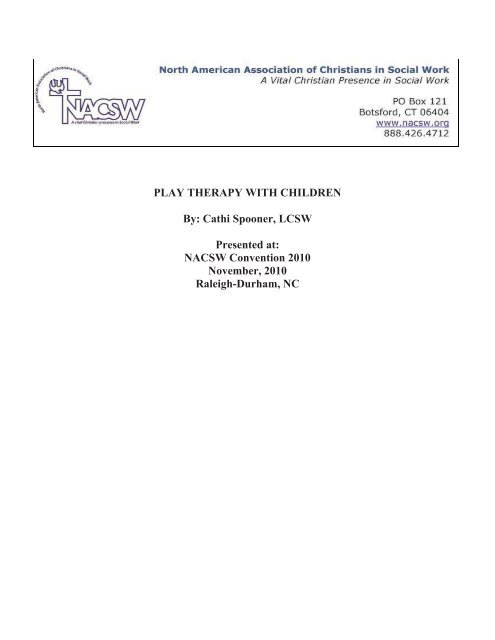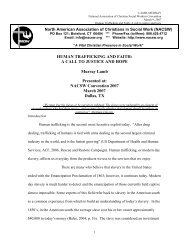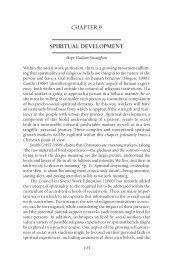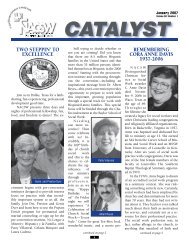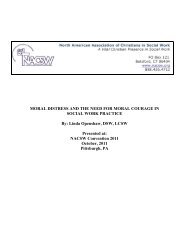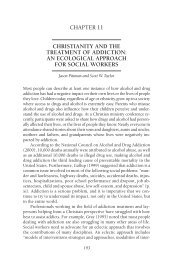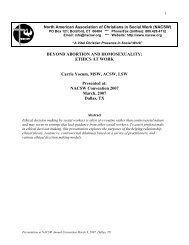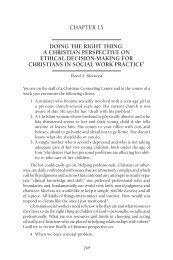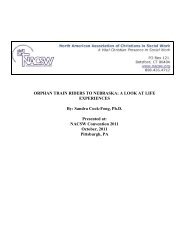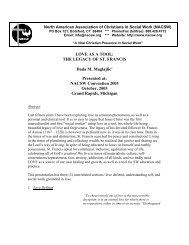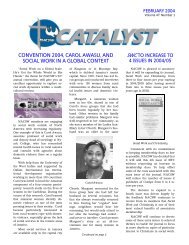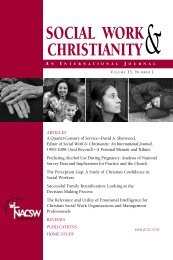Play Therapy with Children
Play Therapy with Children
Play Therapy with Children
You also want an ePaper? Increase the reach of your titles
YUMPU automatically turns print PDFs into web optimized ePapers that Google loves.
PLAY THERAPY WITH CHILDREN<br />
By: Cathi Spooner, LCSW<br />
Presented at:<br />
NACSW Convention 2010<br />
November, 2010<br />
Raleigh-Durham, NC
<strong>Play</strong> <strong>Therapy</strong> <strong>with</strong> <strong>Children</strong><br />
Understanding the Power of <strong>Play</strong> and Spirituality in<br />
Clinical Practice <strong>with</strong> <strong>Children</strong><br />
Presented by Cathi Spooner, LCSW, RPT/S<br />
VAPT NOVA Chapter Chair<br />
Phoenix Family Counseling & <strong>Play</strong> <strong>Therapy</strong> Center, PLLC
What is <strong>Play</strong> <strong>Therapy</strong>?<br />
Association of <strong>Play</strong> <strong>Therapy</strong> (1997) defines play<br />
therapy as:<br />
“…the systematic use of a theoretical model to establish<br />
an interpersonal process wherein trained play therapists<br />
use the therapeutic powers of play to help clients<br />
prevent or resolve psychosocial difficulties and achieve<br />
optimal growth and development.”<br />
Key element: theoretical orientation and training<br />
to implement the strategies of the theory<br />
Phoenix Family Counseling & <strong>Play</strong> <strong>Therapy</strong> Center, PLLC
Power and Benefit of <strong>Play</strong> <strong>with</strong><br />
<strong>Children</strong> in Treatment<br />
The American Academy of Pediatrics states:<br />
“<strong>Play</strong> allows children to create and explore a world<br />
they can master, conquering their fears while<br />
practicing adult roles, sometimes in conjunction<br />
<strong>with</strong> other children or adult caregivers. As they<br />
master their world, play helps children develop<br />
new competencies that lead to enhanced<br />
confidence and resiliency they need to face future<br />
challenges.”<br />
Pediatrics, Volume 119, Number 1, January 2007<br />
Phoenix Family Counseling & <strong>Play</strong> <strong>Therapy</strong> Center, PLLC
Therapeutic Powers of <strong>Play</strong><br />
by Charles Schaefer (Adapted)<br />
Overcoming resistance<br />
<strong>Play</strong> is natural and fun behavior for children which<br />
helps to establish a working therapeutic alliance.<br />
Communication<br />
<strong>Children</strong> often have difficulty expressing<br />
themselves verbally to communicate feelings,<br />
thoughts and needs. <strong>Play</strong> offers them a “natural”<br />
means of communication. Schaefer states, “<strong>Play</strong> is<br />
to the child what verbalization is to the adult- the<br />
most natural medium for self-expression.”<br />
Phoenix Family Counseling & <strong>Play</strong> <strong>Therapy</strong> Center, PLLC
Therapeutic Powers of <strong>Play</strong><br />
by Charles Schaefer (Adapted)<br />
Competence<br />
<strong>Children</strong> enjoy playing which means they will<br />
spend much time involved in playing. <strong>Play</strong>ing<br />
allows opportunity to enhance self-esteem by<br />
satisfying the child’s internal motivation to explore<br />
and master the environment.<br />
Creative Thinking<br />
<strong>Play</strong> encourages creativity and flexibility <strong>with</strong>out<br />
fear of negative consequences so children can try<br />
out different problem solving strategies.<br />
Phoenix Family Counseling & <strong>Play</strong> <strong>Therapy</strong> Center, PLLC
Therapeutic Powers of <strong>Play</strong><br />
by Charles Schaefer (Adapted)<br />
Catharsis<br />
<strong>Children</strong> often have difficulty ventilating intense<br />
feelings and play allows an opportunity to release<br />
these pent up feelings <strong>with</strong> some emotional<br />
distance. Releasing these feelings can often<br />
facilitate a inner peace.<br />
Phoenix Family Counseling & <strong>Play</strong> <strong>Therapy</strong> Center, PLLC
Therapeutic Powers of <strong>Play</strong><br />
by Charles Schaefer (Adapted)<br />
Abreaction<br />
Schaefer states that, “Abreaction is the reliving of<br />
past stressful events and the emotions associated<br />
<strong>with</strong> them. In play, children can slowly mentally<br />
digest and assimilate traumatic experiences by<br />
reliving them <strong>with</strong> a appropriate release of affect.”<br />
The play therapist can help the child to reexperience<br />
the event in a different way and gain a<br />
sense of mastery and empowerment.<br />
Phoenix Family Counseling & <strong>Play</strong> <strong>Therapy</strong> Center, PLLC
Therapeutic Powers of <strong>Play</strong><br />
by Charles Schaefer (Adapted)<br />
Role-playing<br />
<strong>Play</strong> allows children to try out different roles and<br />
behaviors to experience things from a different<br />
perspective and develop a sense of self as separate<br />
from others.<br />
Fantasy/Visualization<br />
Imagination is enhanced through play. Schaefer states,<br />
“Pretending gives a child power over the world, even<br />
when he does not have much control in real life… This<br />
power and control is ego-boosting and augments an<br />
inner locus of control.” The possibilities <strong>with</strong><br />
imagination are endless <strong>with</strong> a child in what he can<br />
achieve and overcome.<br />
Phoenix Family Counseling & <strong>Play</strong> <strong>Therapy</strong> Center, PLLC
Therapeutic Powers of <strong>Play</strong><br />
by Charles Schaefer (Adapted)<br />
Metaphoric Teaching<br />
<strong>Play</strong> allows the opportunity to develop new myths<br />
or metaphors to address issues related to<br />
unconscious content. The therapist can observe a<br />
child’s fantasy play and gain understanding into the<br />
concerns of the child.<br />
Phoenix Family Counseling & <strong>Play</strong> <strong>Therapy</strong> Center, PLLC
Therapeutic Powers of <strong>Play</strong><br />
by Charles Schaefer (Adapted)<br />
Attachment Formation<br />
<strong>Play</strong>ful interactions <strong>with</strong> smiling and positive touch<br />
are natural and enjoyable ways for children to connect<br />
<strong>with</strong> adults.<br />
Relationship Enhancement<br />
Schaefer states, “Through play, a pleasure bond is<br />
formed that makes each party more attractive to the<br />
other. Once formed, mutual feelings of warmth and<br />
closeness between therapist and child contribute to<br />
the child’s sense of wellbeing.”<br />
Phoenix Family Counseling & <strong>Play</strong> <strong>Therapy</strong> Center, PLLC
Therapeutic Powers of <strong>Play</strong><br />
by Charles Schaefer (Adapted)<br />
Positive Emotion<br />
<strong>Play</strong>ing is fun and children enjoy it which can be<br />
uplifting for the child and relieve stress.<br />
Mastering Developmental Fears<br />
<strong>Children</strong> can overcome their fears by repeatedly<br />
playing out threatening stimuli and finding ways to<br />
master and overcome their fears.<br />
Phoenix Family Counseling & <strong>Play</strong> <strong>Therapy</strong> Center, PLLC
Therapeutic Powers of <strong>Play</strong><br />
by Charles Schaefer (Adapted)<br />
Game <strong>Play</strong><br />
<strong>Play</strong>ing games involves adhering to a<br />
predetermined set of rules which provides<br />
opportunities for children to learn socialization<br />
skills. Rules involve playing fair, taking turns, and<br />
learning to lose and win graciously. Ego control<br />
and focus must override impulsive behavior.<br />
Phoenix Family Counseling & <strong>Play</strong> <strong>Therapy</strong> Center, PLLC
Phoenix Family Counseling & <strong>Play</strong> <strong>Therapy</strong> Center, PLLC
Phoenix Family Counseling & <strong>Play</strong> <strong>Therapy</strong> Center, PLLC
Types of <strong>Play</strong> <strong>Therapy</strong><br />
Child Centered<br />
Child Led<br />
Relationship Focused<br />
Safe and Secure Space<br />
Unconditional Positive<br />
Regard<br />
Belief in Child’s Internal<br />
Drive for Healing<br />
Directed Approach<br />
Therapist Led<br />
Symptom Focused<br />
Safe and Secure Space<br />
Unconditional Positive<br />
Regard<br />
Apply Specific Theory<br />
Model to Change<br />
Symptom<br />
Phoenix Family Counseling & <strong>Play</strong> <strong>Therapy</strong> Center, PLLC
An Integrated Approach<br />
<strong>Play</strong> <strong>Therapy</strong><br />
Non – Direct<br />
Child Centered<br />
<strong>Play</strong> <strong>Therapy</strong><br />
Direct<br />
Skills focused<br />
Expressive Arts<br />
Sandtray Art<br />
Non Direct Direct<br />
Non<br />
Direct<br />
Direct<br />
Phoenix Family Counseling & <strong>Play</strong> <strong>Therapy</strong> Center, PLLC
How Can <strong>Play</strong> <strong>Therapy</strong> Benefit <strong>Children</strong>?<br />
Phoenix Family Counseling & <strong>Play</strong> <strong>Therapy</strong> Center, PLLC
How Can <strong>Play</strong> <strong>Therapy</strong> Benefit <strong>Children</strong>?<br />
Phoenix Family Counseling & <strong>Play</strong> <strong>Therapy</strong> Center, PLLC
How Can <strong>Play</strong> <strong>Therapy</strong> Benefit <strong>Children</strong>?<br />
Phoenix Family Counseling & <strong>Play</strong> <strong>Therapy</strong> Center, PLLC
How Can <strong>Play</strong> <strong>Therapy</strong> Benefit <strong>Children</strong>?
How Can <strong>Play</strong> <strong>Therapy</strong> Benefit <strong>Children</strong>?<br />
Phoenix Family Counseling & <strong>Play</strong> <strong>Therapy</strong> Center, PLLC
How Can <strong>Play</strong> <strong>Therapy</strong> Benefit <strong>Children</strong>?<br />
Phoenix Family Counseling & <strong>Play</strong> <strong>Therapy</strong> Center, PLLC
How Can <strong>Play</strong> <strong>Therapy</strong> Benefit <strong>Children</strong>?<br />
Phoenix Family Counseling & <strong>Play</strong> <strong>Therapy</strong> Center, PLLC
How Can <strong>Play</strong> <strong>Therapy</strong> Benefit <strong>Children</strong>?<br />
Phoenix Family Counseling & <strong>Play</strong> <strong>Therapy</strong> Center, PLLC
How Can <strong>Play</strong> <strong>Therapy</strong> Benefit <strong>Children</strong>?<br />
Phoenix Family Counseling & <strong>Play</strong> <strong>Therapy</strong> Center, PLLC
How Can <strong>Play</strong> <strong>Therapy</strong> Benefit <strong>Children</strong>?<br />
Phoenix Family Counseling & <strong>Play</strong> <strong>Therapy</strong> Center, PLLC
What Does Scripture Say?<br />
“Then little children were brought to Jesus for Him to<br />
place His hands on them and pray for them. But the<br />
disciples rebuked those who brought them. Jesus said,<br />
“Let the little children come to me, and do not hinder<br />
them, for the kingdom of heaven belongs to such as<br />
these.” Matthew 19:13-14<br />
“He took a little child and had him stand among them<br />
[disciples]. Taking him in His arms, He said to them,<br />
‘Whoever welcomes these little children in my name<br />
welcomes Me; and whoever welcomes Me does not<br />
welcome Me but the One who sent Me. ‘ ”<br />
Mark 9: 36-37<br />
Phoenix Family Counseling & <strong>Play</strong> <strong>Therapy</strong> Center, PLLC
What Does Scripture Say?<br />
“And the wolf will dwell <strong>with</strong> the lamb, and the<br />
leopard will lie down <strong>with</strong> the kid, and the calf<br />
and the young lion and the fatling together; and<br />
a little child will lead them.” Isaiah 11:6<br />
“When I was a child, I used to speak as a child,<br />
think as a child, reason as a child; when I<br />
became a man, I did away <strong>with</strong> childish things.”<br />
1Cor. 13:11<br />
Phoenix Family Counseling & <strong>Play</strong> <strong>Therapy</strong> Center, PLLC
What Does It All Mean?<br />
Jesus always engaged <strong>with</strong> people in a<br />
manner that was meaningful to them- at<br />
their developmental level and cultural<br />
relevance.<br />
Jesus highly regarded children and His<br />
people are regularly referred to as<br />
“children.”<br />
Phoenix Family Counseling & <strong>Play</strong> <strong>Therapy</strong> Center, PLLC
What Does It All Mean?<br />
God’s purpose for His “children” is to<br />
reflect Jesus- His light into a dark world.<br />
A key element used by Jesus is relationship<br />
and meeting people “where they are”-<br />
developmentally, emotionally, cognitively and<br />
spiritually.<br />
Early intervention in childhood increases<br />
the likelihood of living an “abundant life”<br />
reflecting the power and love of Jesus- which<br />
starts <strong>with</strong> a healthy childhood and<br />
understanding our value and worth during<br />
childhood.<br />
Phoenix Family Counseling & <strong>Play</strong> <strong>Therapy</strong> Center, PLLC
Strategies for Clinical Practice<br />
Rosebush Drawing- (Violet Oaklander)<br />
Before and After Drawing<br />
Color My Feelings<br />
Phoenix Family Counseling & <strong>Play</strong> <strong>Therapy</strong> Center, PLLC


